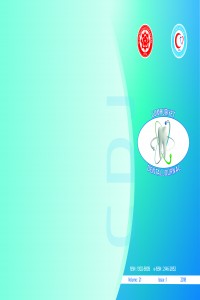Abstract
This clinical report
describes the details of a prosthodontic rehabilitation of an elderly patient who
was diagnosed with mucoepidermoid carcinoma. The palatal defect has caused
problems in phonetics and mastication. A previous obturator was made using
conventional Poly(methyl methacrylate) (PMMA). This obturator has caused some
discomfort due to food impaction and irritation of the fitting surface over the
tissue defect areas. This had resulted in frequent erythema of the areas. Therefore,
a new palatal obturator was made still using PMMA but with an addition of an
indirect soft acrylic resin over the defect areas. The soft acrylic resin
serves to reduce painful irritation of the obturator over the soft tissues
around the defect areas. The review appointments up to 6 months revealed
satisfactory results with no deterioration in the prosthesis.
References
- 1. Keyf, F. Obturator prostheses for hemimaxillectomy patients. J Oral Rehabil 2001; 28;821-829.
- 2. Gay WD and King GE. Applying basic prosthodontic principles in the dentulous maxillectomy patient. J Prosthet Dent 1980;43(4):433-435.
- 3. Phasha Z and Sharma K. Mucoepidermoid carcinoma of palate mimicking vascular lesion: A case report. J Dent Sci Res 2013;4:9-12.
- 4. Ikusika, OF, Dosumu OO, Ajayi DM, Ogunrinde TJ. Effect of resilient lining of obturator bulbs on patients with maxillectomies. J Prosthet Dent 2016;116(6):932-936. e931.
Abstract
Bu klinik olguda, mukoepidermoid karsinom tanısı
konan yaşlı bir hastanın protez rehabilitasyonunun detayları açıklanmaktadır.
Palatal defekt, konuşma ve çiğneme sorunlarına neden olmuştur. Önceki bir
obtüratör, geleneksel polimetil metakrilat (PMMA) kullanılarak yapılmıştı. Bu
obtüratör, gıda retansiyonu ve doku yüzey alanlarının üzerinde doldurucu
yüzeyinin tahriş olmasına bağlı olarak bazı rahatsızlıklara neden olmuştur. Bu,
bölgelerin sık sık eritemine neden olmuştur. Bu nedenle, yeni bir palatal
obturatör hala PMMA kullanılarak yapıldı, ancak farklı olarak defekt alanları
üzerinde dolaylı bir yumuşak akrilik rezin ilave edildi. Yumuşak akrilik rezin,
obturatörün, defekt alanlarının etrafındaki yumuşak dokular üzerindeki ağrılı
tahrişini azaltmaya yarar. 6 aya kadar olan gözden geçirme randevuları,
protezde bozulma olmaksızın tatmin edici sonuçlar verdi. Ancak, takip
randevusunda 9 ay sonra, dolaylı yumuşak akrilik reçinenin yerleştirildiği
montaj yüzeyinde bazı siyah lekeler görüldü. Swablar, obtüratör üzerindeki
siyah alandan ve ilgili mukozadan intraoral olarak alındı. Swablar, lekelenmeye
neden olan mikroorganizmaları bulmak için bir kültür ve duyarlılık testine
gönderildi. Sonuç, her iki bölgede de hiçbir mikroorganizma olmadığını
doğruladı. Bu durum, hastanın uyguladığı oral hijyene rağmen yumuşak akrilik
rezinin yüzeyinde leke oluşabileceğini düşündürdü. Durumu izlemek için daha
fazla takip yapılacaktır.
References
- 1. Keyf, F. Obturator prostheses for hemimaxillectomy patients. J Oral Rehabil 2001; 28;821-829.
- 2. Gay WD and King GE. Applying basic prosthodontic principles in the dentulous maxillectomy patient. J Prosthet Dent 1980;43(4):433-435.
- 3. Phasha Z and Sharma K. Mucoepidermoid carcinoma of palate mimicking vascular lesion: A case report. J Dent Sci Res 2013;4:9-12.
- 4. Ikusika, OF, Dosumu OO, Ajayi DM, Ogunrinde TJ. Effect of resilient lining of obturator bulbs on patients with maxillectomies. J Prosthet Dent 2016;116(6):932-936. e931.
Details
| Primary Language | English |
|---|---|
| Subjects | Health Care Administration |
| Journal Section | Case Reports |
| Authors | |
| Publication Date | April 24, 2018 |
| Submission Date | September 27, 2017 |
| Published in Issue | Year 2018Volume: 21 Issue: 1 |
Cited By
Enhancing quality of life: A hollow bulb obturator in palatal defect rehabilitation - A case report
International Journal of Oral Health Dentistry
https://doi.org/10.18231/j.ijohd.2023.044
Cumhuriyet Dental Journal (Cumhuriyet Dent J, CDJ) is the official publication of Cumhuriyet University Faculty of Dentistry. CDJ is an international journal dedicated to the latest advancement of dentistry. The aim of this journal is to provide a platform for scientists and academicians all over the world to promote, share, and discuss various new issues and developments in different areas of dentistry. First issue of the Journal of Cumhuriyet University Faculty of Dentistry was published in 1998. In 2010, journal's name was changed as Cumhuriyet Dental Journal. Journal’s publication language is English.
CDJ accepts articles in English. Submitting a paper to CDJ is free of charges. In addition, CDJ has not have article processing charges.
Frequency: Four times a year (March, June, September, and December)
IMPORTANT NOTICE
All users of Cumhuriyet Dental Journal should visit to their user's home page through the "https://dergipark.org.tr/tr/user" " or "https://dergipark.org.tr/en/user" links to update their incomplete information shown in blue or yellow warnings and update their e-mail addresses and information to the DergiPark system. Otherwise, the e-mails from the journal will not be seen or fall into the SPAM folder. Please fill in all missing part in the relevant field.
Please visit journal's AUTHOR GUIDELINE to see revised policy and submission rules to be held since 2020.


